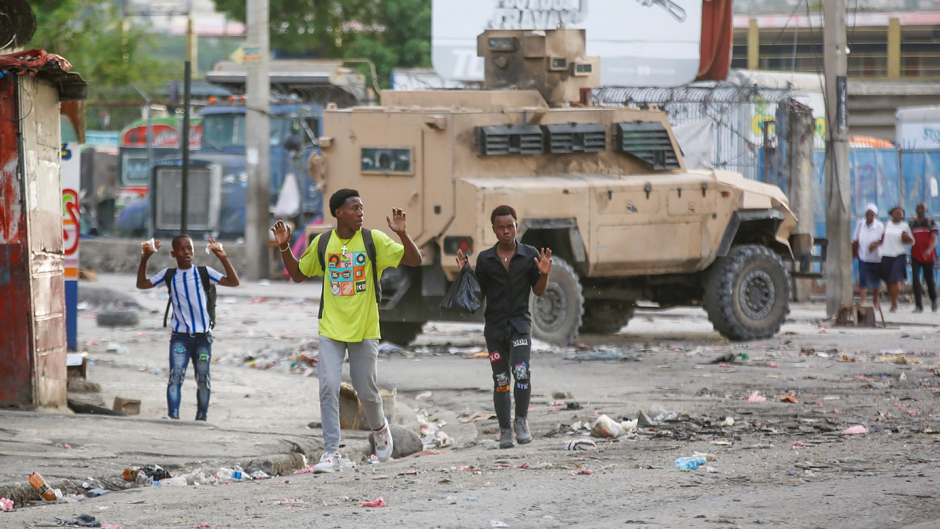Haiti is a step away from total collapse and becoming a failed state.
The government declared a state of emergency on Sunday after armed gangs stormed the Toussaint Louverture International Airport and two local jails releasing hundreds of prisoners. News reports said that the gangs want to take over control of the government and the capital, Port-au-Prince.
All this is happening as Ariel Henry, the de facto prime minister, was out of the country. He is now in Puerto Rico trying to return to Haiti. Haiti has been in a downward spiral since the assassination of President Jovenel Moïse on July 7, 2021. Elections have not been held since 2017, and Henry has lost the support of the people.
The Miami Herald has reported that the United States has asked Henry to agree to a transitional government and to resign.
To help quell the increasing violence and to support Haitian police in fighting the gangs, last year Kenya had agreed to lead a multinational force to Haiti. But Kenyan courts delayed the deployment. Henry flew to Kenya to finalize the process.
Flights in and out of Haiti have been cancelled and news reports say that hundreds of Haitians are suffering from lack of food and water.
Haitian-born MarieGuerda Nicolas, psychologist and professor in the University of Miami School of Education and Human Development, and Irwin Stotzky, professor of law, provide insights into the current state of affairs in Haiti.
What is the state of Port-au-Prince right now?
Nicolas: Port-au-Prince is in total chaos. Nothing is functioning and the people are hiding in their homes and cannot mobilize or move around in the same way.
Stotzky: It is a horrendous condition. Gangs have taken over the country and they do not have a functioning government. Henry is a mouthpiece for special interests and does not care in the least for the Haitian people. He cares only about his own needs.
Today there are no elected officials in office and there are no elections in sight and Haitians obviously face catastrophic humanitarian conditions.
What can be done to quell this violence?
Nicolas: It is a simple formula that people in Haiti have been saying since President Moïse died and the international community, led by the United States, put Henry in place. It has been clear that the people have said they want an interim government selected by the people, from the ground up! Moreover, they want to make sure that they can run their own elections and create their own destiny. The United States has said no to that.
Once Henry went to Kenya to sign this agreement, that is what led to this outbreak. People have said, “No, we will not allow this de facto president to continue running the country.” If we want to see peace, Henry has to resign and an interim group has to be put in place. He was never the people’s choice. The United States put him in place.
Stotzky: The U.S. faces its own presidential elections this year and, of course, a critical moment in our history. Will we maintain our democracy? It would be in the best interest of the United States and the Haitian people if President Biden would allow the people of Haiti to elect someone they wanted in office. Maybe this will allow the Haitian people to have a chance to change things and create a democratic nation.
If they don’t let the Haitian people play the major role in running their country, we will have gangs running the country and people dying. We will have Haitians coming to the United States when we already have a crisis at our border.
Given the level of disruption going on, how could a transitional government be put together?
Nicolas: The people of Haiti can put that together. It is not an external thing. People there can absolutely determine their own destiny. This is what the international community refuses to accept. Haitians can think for themselves. There are organizations inside the country, including the Montana group, that can come together. A few years ago, civil society groups came together to look at what a civil society should look like and there are plenty of groups that have the capability and the ability to do this. Let them be able to fill in the transitional space.
Stotzky: The U.S. can help democratic groups in Haiti gain some power, and there are grassroots groups who have the interest of the people. But first they have to have elections and get rid of the gangs. It is a failed state.
Will sending outside intervention help?
Nicolas: No outside intervention will help because the people of Haiti have been very clear that they do not want international interference. The reason why Haiti is in the mess it is in is because of international interference. The people have been saying over and over again that they do not want the Kenyans to come. If Kenya comes to Haiti, it is really against the will of the people.
What about the people that are going hungry?
Nicolas: So, the narrative is that people are going hungry in Haiti so we have to step in. People are going hungry in Miami-Dade and in Mississippi. People going hungry is not an excuse to invade the country. If the situation was a bit different, the people in the south and the north of Haiti, who have plenty of food, could send food to the people in Port-au-Prince.

